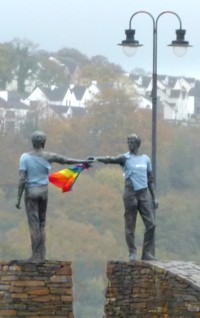Independence, Home Rule and Partition
By the end of the 19th century Ireland's population was back under four million.
Many Irishmen wanted the same privileges enjoyed by the dominions like Canada, Australia and New Zealand: Home Rule. The country was divided. Industrialisation had come to the North, principally around flax, that was the basis if the linen industry, and then shipbuilding, that provided skilled jobs and locked that part of Ireland more firmly to Britain.
In predominantly Protestant Ulster the concept of Home Rule was anathema. Influential figures like Rudyard Kipling demanded that Ireland remained British. In 1912 half a million people in Ireland and some in Scotland signed a 'Covenant of resistance' against the proposed Home Rule Bill that was before Parliament. Women still had no vote but 230,000 signed a 'Declaration' to the effect that they wished to 'associate ourselves' with the Men of Ulster in 'uncompromising opposition to Home Rule'.
The Ulster Covenant - signed by several McKie's and Ellson's (Wendy's mother's family - also an unusual spelling)
We, whose names are underwritten, women of Ulster, and loyal subjects of our gracious King,
being firmly persuaded that Home Rule would be disastrous to our Country,
desire to associate ourselves with the men of Ulster in their uncompromising opposition to the Home Rule Bill now before Parliament,
whereby it is proposed to drive Ulster out of her cherished place in the Constitution of the United Kingdom,
and to place her under the domination and control of a Parliament in Ireland.
Praying that from this calamity God will save Ireland, we hereto subscribe our names.
Nevertheless 'Home Rule' was eventually passed into British law, much to the dismay of the Loyalists in Ulster and to the derision of those wanting complete independence, but the start of First World War in 1914 caused its implementation to be deferred.
When the Great War began many Irishmen volunteered but as it progressed and the death toll rose alarmingly conscription was proposed. This played into the hands of those favouring a Republic, particularly where sectarian and related class enmity remained a smouldering time-bomb to be exploited.
We have now moved forward into my Father's lifetime and the following events were reported on the front pages of the newspapers he read to radio broadcasts he listened to and to the newsreels played during the movies he went to.
Sectarian and class enmity frequently led to violence. During Easter in 1916 there was an uprising in Dublin that destroyed property. In comparison to other incidents this was a relatively minor event and the culprits were quickly caught and jailed. But in a serious misjudgement of the growing anti-British sentiment several of the leaders were hanged. The mistake was quickly realised and the hangings curtailed but it was too late. The dead became martyrs to the Republican cause. The country erupted into civil war. During the next six years the Irish Republican Army (IRA) waged a guerrilla war against the government so that by 1922, to bring an end the violence, both parliaments ratified an Anglo-Irish Treaty, formalising independence for the 26 county Irish Free State: Éire, which renamed itself Ireland in 1937, and finally declared itself a republic in 1949. The remaining 6 counties were partitioned off as a new country, Northern Ireland, also with, initially unwanted, Home Rule. Thus, as Scotland would have to fight for later, Northern Ireland was dragged, kicking and screaming, to become a self-governing country, separate to the United Kingdom.
Like Brer Rabbit and the Briar Patch Northern Ireland's new independent Parliament didn't really mind. They set about keeping the new country Protestant by means of an electoral gerrymander that would have been illegal in the UK. Catholics, who were in the majority in some places, like Londonderry, again found themselves second-class citizens. Their grievances included Parliament's unwillingness or inability to remediate the slums of Londonderry and Belfast. This played into the hands of those who wanted a reunified Ireland. Hard-line Republicans had always held that Ireland was the entire 'island of Ireland' and it had now been made easy to ferment Catholic rebellion in Northern Ireland, preliminarily to annexing it to the whole. The IRA's 'provisional' arm became dedicated to this goal. The Ulster Volunteer Force (UVF) and the Ulster Defence Association (UDA) were just as determined to keep Northern Island separate and British.
And now we are within my living memory.
Soon ongoing unrest in Ireland ranked alongside: the partition of India; the creation of Israel; the war in Korea; the independence of Indonesia; the 'Suez crisis'; the fall of French Indochina; the Malayan Emergency; the Cuban Missile Crisis; the Six Days War; and the Vietnam War, in my growing awareness of newsworthy world events.

